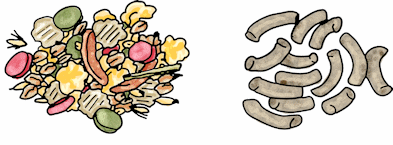Muesli v. Pellets – Research into Rabbit Diets
Last April there was a lot of publicity over some joint research by the the Royal (Dick) School of Veterinary Studies and Burgess Pet Care into the effects of diet on rabbit’s health. The paper with the results was just published and I thought I’d summarise some of the findings for you.
What they studied
Thirty two dutch rabbits were neutered, vaccinated and divided into four groups to feed one of the following diets:
- Extruded nuggets with hay (EH)
- Muesli with hay (MH)
- Hay only (HO)
- Muesli only (MO)

Left – muesli, a mix of grains, squished peas, stalks, and pellets. Right – extruded nuggets.
They were then monitored over an 18 month period to observe the impact of the diets. The researchers measured things like how much food they ate and what came out the other end, and took x-rays of their teeth at regular intervals.
Hay Intake
Unsurprisingly the hay only group had the largest hay intake, but there were also differences between the Muesli-Hay and Nugget-Hay groups, with the Nugget-Hay group consuming the higher portion of hay.
Selective Feeding
All the rabbits on muesli selectively feed (left some of the components of the mix). They general left the the pellets, but in some cases the grains and alfalfa stalks too – although this is just one type of mix so it’s possible preferences could vary. The concern with selective feeding is that when the nutritional contents is calculated it assumes all the components are eaten, and rabbits may miss out on nutrients if the leave parts of the food.
Changes in Teeth
The study measured the growth and wear rate of the incisor (front) teeth, and noted that although in all the groups the amount of growth matched the amount of wear (the teeth didn’t overgrow), in the hay only group the teeth wore down and regrew at a faster rate.
They also noted that the both MO and MH groups developed longer premolars (the first of the teeth in the back of the mouth) and the teeth became more curved, changes which they propose many be early signs of dental problems. Three of the Muesli Only group also had to be removed from the study after developing dental disease.
Calcium/Phosphorus
On the subject of teeth, it’s been suggested in the past that a contributing factor to teeth issues in rabbits maybe selective feeding resulting in a poor calcium/phosphorous level/ratio which effect bone/teeth formation. However, this study found that when they calculated the rabbit calcium/phosphorous intake on just the parts of the feed they did eat, the diet still remained within expectable values. Although it might be worth noting this is just one brand of muesli and the same may not be true of all.
Weight
One side effect of a bad diet is weight gain. The study found that the hay only group maintained a perfect body condition, however they were lighter (grew into smaller rabbits) than the other groups. That makes sense, when you consider the origin of commercial rabbit foods was in making rabbits grow faster and larger for purposes we won’t mention here. Both groups eating hay plus either Muesli or Pellets maintained a good body condition, but unsurprisingly those fed Muesli only didn’t fair so well and became obese.
Poop
We all (hopefully) know changes to a rabbit’s poop size and quantity can signal a problem, like the beginning of stasis, therefore monitoring poop is a good way to measure rabbit’s digestive health.
Caecotropes are normally eaten as they are produced, so in a healthy rabbit with a balanced diet they are rare to see. Excess caecotropes (sticky poop) is a common diet related issue in rabbits and the study found that occurred most frequently in the rabbits fed muesli and most of all in those also receiving no hay.
There were also differences in the normal round droppings too; those eating muesli produced fewer and smaller droppings, and by the end of the study those eating muesli and hay were also producing similar small droppings. So even when fed alongside hay, the muesli still had a negative effect on droppings, which in turn might indicate a digestive system that isn’t operating optimally.
What this means
Although I’m sure most of the bunny savvy already feed pellets and hay, it’s nice to have research backing up the feeling that these are the right option for your rabbits health and well-being. Concrete evidence is also important to the manufacturers making decisions about formulating foods for our rabbits. Already some retailers for example Pets at Home, have taken muesli off their stock lists which is great for the health of the wider bunny population.Why not email or write to your local shops and encourage them to review their product selection too?
The message is getting through, the lastest PDSA PAW Report (full report on the report to follow) shows that the portion of owners feeding Muesli dropped from 49% in 2011 to 34% in 2013, but that’s still 1 in 3 rabbit eating a diet that may cause serious health issues.
Need more diet info?
If you’d like to learn more about bunny food, I’ve a section on rabbit diets on the main site, including information on choosing dry food and a chart comparing popular brands.
Any questions, feel free to leave them in the comments…
Refs
Prebble, J., Meredith, A. (2013) Feeding rabbits and getting it right – the effects of diet on health and behaviour, Royal (Dick) School of Veterinary Studies, University of Edinburgh, Scotland, UK.
Prebble, J., Meredith, A. (2014) Food and water intake and selective feeding in rabbits on four feeding regimes, Journal of Animal Physiology and Animal Nutrition.


Thanks, for the helpful article. I’ve had a read of the 2014 paper and it mentions the DM and hay intake and early signs of dental disease but not other things like poo and weight. Were these in the 2013 paper? If so, could you send me a link to it or tell me where I could find it – can’t seem to find it anywhere! Thanks